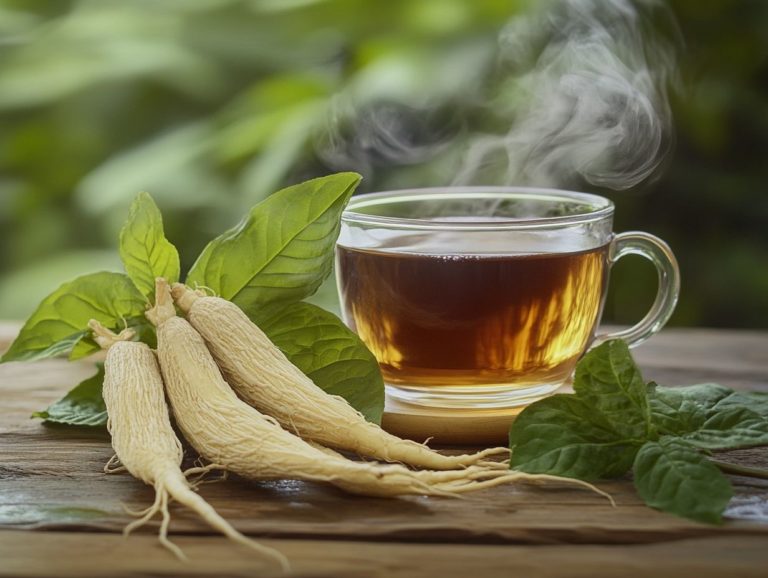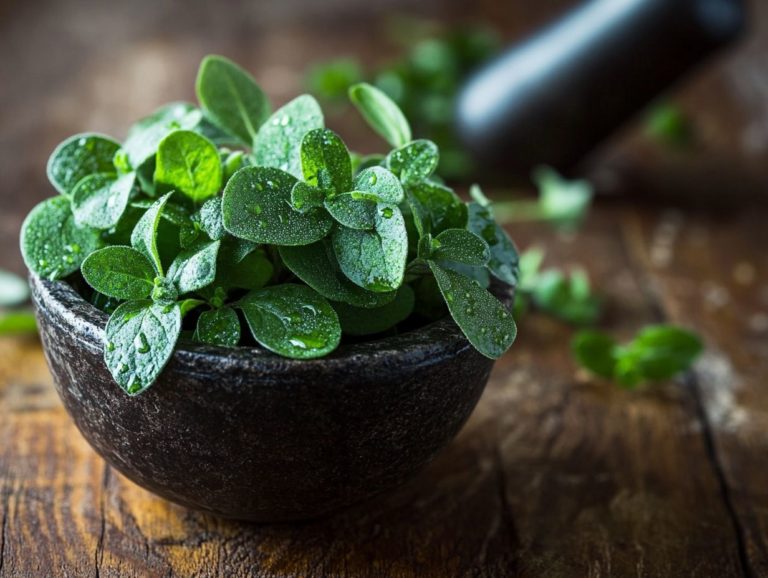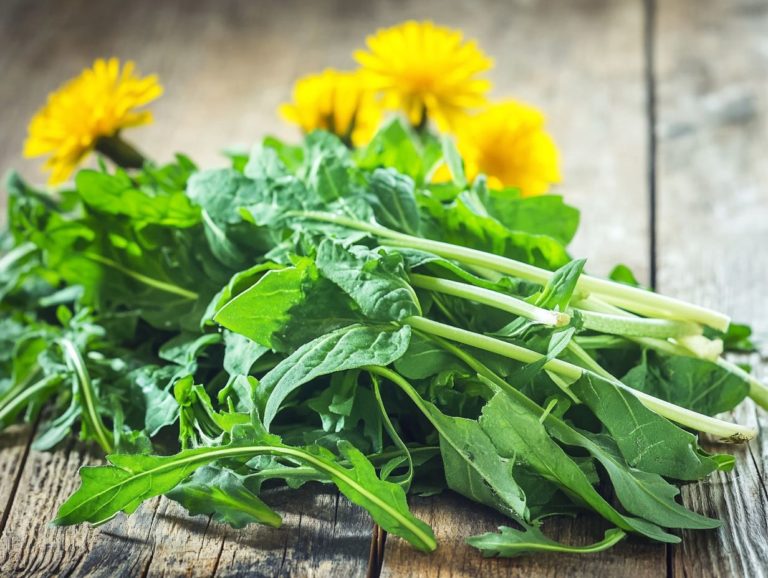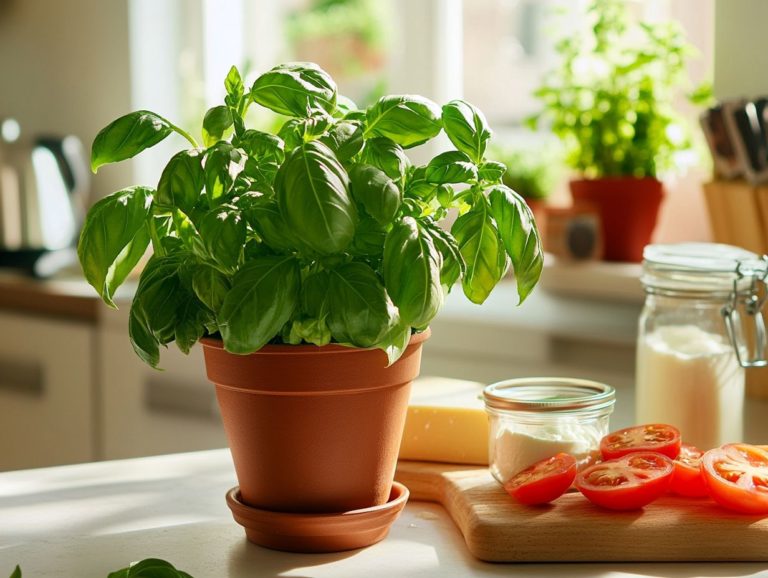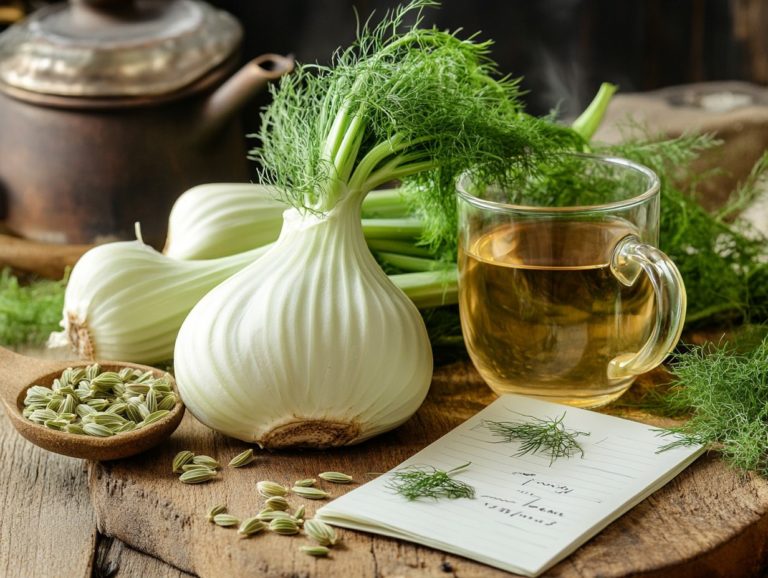5 Herbs That Support Healthy Digestion
Struggling with digestive issues? You re certainly not alone. Many individuals face discomfort, bloating, and a host of other digestive troubles, including heartburn and dyspepsia.
Fortunately, nature provides an array of herbal remedies designed to soothe your stomach and promote overall digestive health. This article delves into five powerful herbs ginger, peppermint, fennel, chamomile, and turmeric that can effectively support your digestive system.
Discover how these herbs work wonders in your body! The article also highlights other lifestyle changes, such as using digestive bitters and adopting a more balanced diet, that can enhance your digestive well-being.
Keep reading to reclaim comfort and balance in your gut today!
Contents
Key Takeaways:
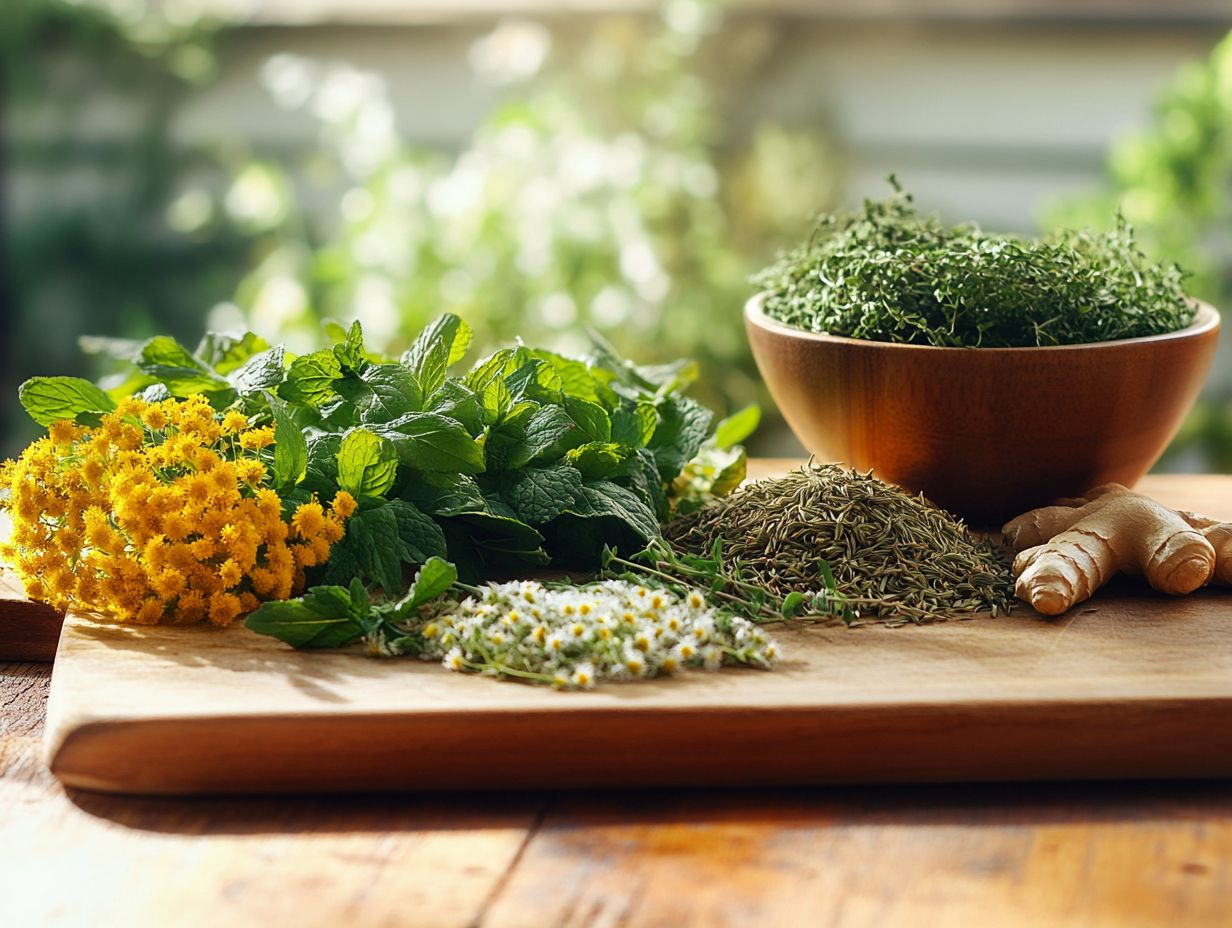
- Ginger aids in digestion by reducing inflammation and easing stomach discomfort.
- Peppermint helps relax the muscles of the stomach and alleviate bloating and gas.
- Fennel stimulates digestion and relieves constipation and stomach cramps.
1. Ginger
Ginger, or Zingiber officinale for those who enjoy a bit of science, stands out as a celebrated digestive ally and a well-known remedy for nausea and motion sickness. For centuries, it has been your go-to remedy for alleviating nausea, motion sickness, and various digestive disorders. It s a must-have for your digestive health journey!
Its historical significance is quite fascinating, transcending cultures from ancient Chinese medicine to the principles of Ayurveda, each showcasing its remarkable versatility. The active compounds, including gingerol and shogaol, not only infuse your dishes with that signature spicy kick but also enhance digestion by boosting gastric motility.
Many individuals find solace in ginger tea, brewed by steeping fresh ginger slices in hot water. It provides a soothing remedy for any gastrointestinal discomfort and digestive spasm. You can easily incorporate grated ginger into your stir-fries or smoothies, effortlessly reaping its benefits.
Whether you’re looking to calm an upset stomach or ease nausea during pregnancy, this powerful root offers practical solutions that seamlessly fit into your daily culinary repertoire, including the top 5 herbs for hormonal health.
2. Peppermint
Peppermint, or Mentha x piperita, is renowned for its soothing properties, particularly when it comes to alleviating digestive spasms, stomach discomfort, and abdominal distention. The active compounds in peppermint oil work wonders in promoting digestive support.
Peppermint is available in many forms, like teas, essential oils, and capsules designed to dissolve in the intestines, so you can choose what you like best. You might find peppermint tea a delightful choice, celebrated for its refreshing flavor and calming effects.
The oil extracted from its leaves can be utilized in aromatherapy or applied topically, while capsules offer a concentrated dose for those seeking focused relief.
Scientific studies have shown that the menthol content in peppermint can relax the muscles of the stomach, potentially easing symptoms in conditions like irritable bowel syndrome (IBS) and GI upset. Researchers have also discovered that these properties can aid in relieving indigestion and bloating, further solidifying the herb s esteemed place in the realm of natural remedies.
Try these herbs today and feel the difference in your digestive health!
3. Fennel
Fennel, scientifically known as Foeniculum vulgare, is a remarkable herb celebrated for its ability to support digestive health. It s particularly effective in alleviating colic symptoms in both adults and children, often serving as a go-to herbal remedy for digestive wellness.
This versatile plant boasts aromatic seeds and fennel seeds that enhance countless culinary creations. From savory dishes to sweet treats, their unique flavor profile resembles licorice. You can steep these seeds as a tea to tap into their soothing properties, making them an ideal companion for meals rich in spices or fats, further promoting digestive ease.
Their natural carminative qualities, which help relieve gas, not only help alleviate bloating but also contribute to your overall well-being. This establishes fennel seeds as a must-have in both your kitchen and herbal remedy collection.
4. Chamomile
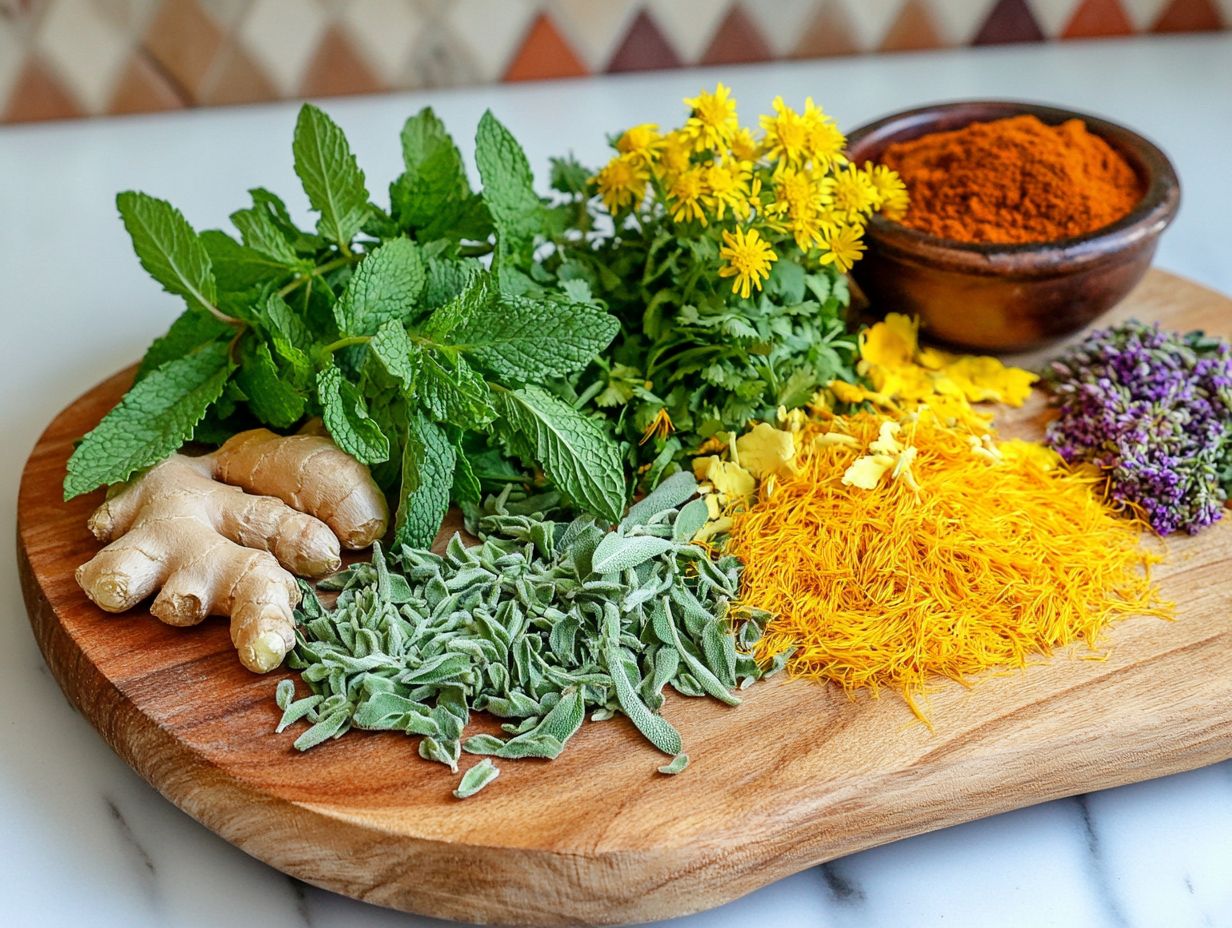
Chamomile, or Matricaria recutita, is your ultimate herbal ally for soothing your digestion and calming your mind! This remarkable botanical remedy not only aids digestion but also supports anxiety relief, acting as a natural nervine that encourages relaxation.
For centuries, this soothing herb has been cherished in various forms, including teas, tinctures, and even homeopathic options, to unlock its impressive benefits. Imagine brewing a cup of chamomile tea as part of your evening ritual, allowing its calming properties to help you unwind after a long day. If you need something more concentrated, tinctures offer an immediate solution for those moments when you need relief fast.
Chamomile relaxes muscles and reduces inflammation, which can be advantageous for managing digestive disorders like irritable bowel syndrome and indigestion. By alleviating stress, chamomile enhances your digestive health, enabling your body to function in a more harmonious way. Additionally, exploring 5 popular herbs for healthy digestion can further support your digestive wellness.
5. Turmeric
Turmeric, known scientifically as Curcuma longa, is not just a vibrant yellow root; it s a powerhouse for your gastrointestinal health, known for its anti-inflammatory properties. With its rich array of naturally occurring compounds, it stands as an essential herbal ally in managing inflammatory bowel disease and various digestive disorders.
The active compound within turmeric, especially curcumin, plays a significant role in promoting your overall well-being. Curcumin is celebrated for its anti-inflammatory and antioxidant properties, which can effectively reduce gut inflammation and enhance nutrient absorption.
In the kitchen, turmeric shines as a spice in curries and smoothies, infusing your meals with flavor and health benefits. It’s especially effective when combined with black pepper extract for better absorption. If you prefer a more concentrated approach, curcumin is available in capsule form, often paired with black pepper extract to boost absorption.
A wealth of scientific studies shows that incorporating turmeric into your diet can support digestive health by balancing gut flora and alleviating indigestion symptoms. This emphasizes its vital role in holistic health practices, making it a valuable addition to your wellness arsenal. For those interested in exploring more natural options, consider DIY herbal remedies for digestive health.
What Causes Poor Digestion?
Poor digestion can stem from various factors, such as nutritional imbalances, stress responses, and deficiencies in digestive enzymes. These elements can collectively contribute to digestive disorders that impact your overall gastrointestinal health.
A high intake of processed foods, low fiber consumption, and erratic eating habits can disrupt your body’s ability to effectively break down and absorb nutrients. A sedentary lifestyle, devoid of regular physical activity, may also hinder your metabolic processes, worsening digestive issues.
Psychological stress can trigger hormone release that interferes with digestion, leading to unwelcome symptoms like bloating, discomfort, and heartburn. It’s essential to maintain a balanced diet rich in whole foods, paired with effective stress management strategies such as mindfulness or exercise, to promote optimal digestive health. Additionally, incorporating the top 5 herbs for respiratory aid can also support overall well-being.
Summary of Key Benefits
- Fennel: Supports digestive wellness and alleviates colic symptoms.
- Chamomile: Eases digestion and promotes relaxation.
- Turmeric: Reduces inflammation and enhances nutrient absorption.
Don t miss out on the benefits of these herbs! Add them to your meals and wellness routine today for a flavorful health boost!
How Do These Herbs Support Digestive Health?
Digestive herbs like ginger, peppermint, fennel, chamomile, and turmeric offer remarkable support for your digestive health. They can alleviate symptoms such as nausea and digestive spasms while enhancing overall digestive function with their natural properties.
Each of these herbs operates through distinct mechanisms. Ginger boosts gastric motility. Peppermint relaxes the digestive tract. Fennel helps reduce bloating. Chamomile calms inflammation. Turmeric serves as a powerful anti-inflammatory agent and also promotes digestive wellness. For more insights on their healing benefits, check out the 5 common herbs with healing properties. Their combined benefits can assist in managing various digestive disorders, making them essential components of your wellness regimen.
In terms of sourcing these herbs, you ll often find fresh or dried options at health food stores or even in your own kitchen garden. If you have a green thumb, consider growing them. This not only provides a fresh supply but also deepens your connection to nature and healthy living through the cultivation of medicinal plants.
What Are the Different Forms of These Herbs?
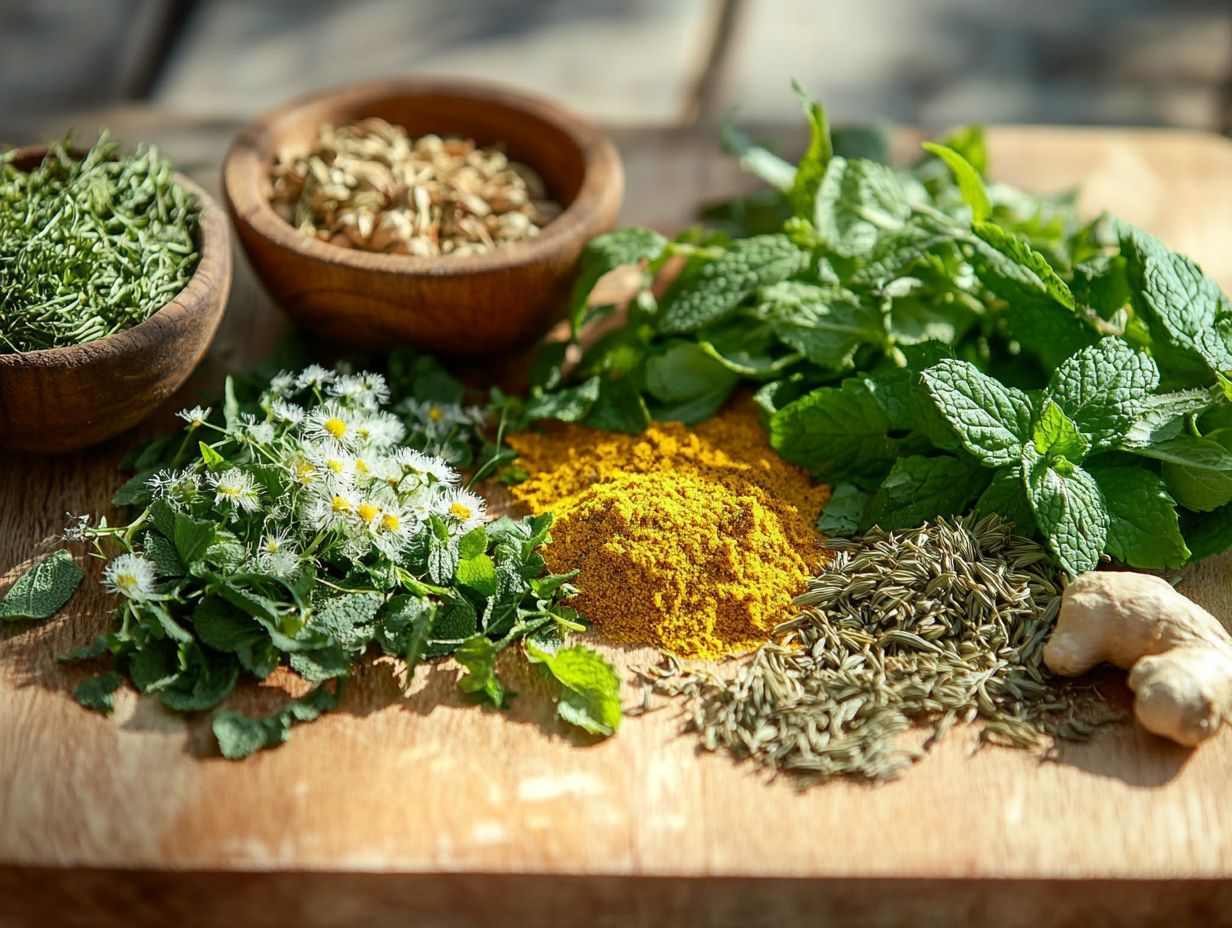
The world of herbs offers a delightful array of options. You ll find ginger, peppermint, fennel, chamomile, and turmeric in exciting forms like teas, essential oils, tinctures, and capsules. Each form brings its own unique benefits, allowing you to tailor your herbal treatment to your preferences.
For example, herbal teas are not just soothing; they can be effortlessly brewed to enhance both flavor and aroma, creating a beloved option for those craving a warm and comforting experience.
Essential oils pack a concentrated punch. You can enjoy them through aromatherapy, especially peppermint oil, or dilute them for topical application. This provides quick absorption and direct relief when you need it most.
Then there are tinctures powerful herbal extracts made with alcohol. They deliver a higher concentration of active compounds, perfect for anyone seeking rapid effects. Capsules are a convenient choice for many. They offer a tasteless alternative, ideal for those sensitive to herbal flavors while still wanting to reap the benefits.
Ultimately, your choice depends on personal preferences and specific needs. Some may find themselves drawn to the immediacy of tinctures, while others might appreciate the gentle, slow-acting embrace of a good cup of tea.
What Are the Possible Side Effects of Using These Herbs?
While herbal treatments such as ginger, peppermint, fennel, chamomile, and turmeric are generally regarded as safe, it s crucial to recognize that potential side effects, like gastrointestinal upset or allergic reactions, may arise. Understanding these effects is important before diving in.
Each herb interacts uniquely depending on your health condition, age, or any medications you might be taking. For example, ginger could lead to heartburn for some, while chamomile might spark allergic reactions in those sensitive to plants from the daisy family. Incorporating 5 herbs for enhancing longevity can also be advantageous, but it’s important to consider these factors carefully.
Therefore, it s wise to consult a healthcare professional before starting any herbal regimen, especially if you have underlying health conditions or are pregnant. Sourcing herbs from reputable health food stores ensures quality and safety, minimizing the risk of contaminants or incorrect dosages that could amplify side effects.
Try adding these herbs to your daily routine now for better digestion!
How Can These Herbs Be Incorporated into One’s Diet?
Incorporating herbs like ginger, peppermint, fennel, chamomile, and turmeric into your diet can be a delightful adventure. You can easily achieve this by adding them to your meals, brewing fragrant herbal teas, or opting for supplements, all aimed at enhancing your digestive health.
For instance, you might grate ginger into your stir-fries or blend it into smoothies for that perfect spicy kick. Peppermint leaves can elevate your salads or infused water, offering a refreshing twist.
Fennel has a unique licorice-like flavor that can be roasted or sliced thinly for a crunchy slaw, bringing an aromatic profile to your dish. Chamomile, often savored as a calming tea, can also enhance baked goods like cookies, imparting a subtle floral note.
And don t overlook turmeric; it s fantastic in curries or golden milk lattes, adding both vibrant color and a wealth of anti-inflammatory benefits.
These simple methods can transform your everyday meals into flavorful and health-enhancing experiences. Make every bite enjoyable and beneficial!
What Other Lifestyle Changes Can Help Improve Digestive Health?
Incorporating beneficial herbs is just one piece of the puzzle. Making lifestyle changes like healthy eating, managing stress, and staying hydrated can significantly boost your digestive health.
These adjustments create a powerful synergy that promotes overall well-being. Regular physical activity stimulates digestive processes and enhances gut motility. Mindfulness practices such as yoga or meditation reduce stress, and incorporating 5 must-try herbs for stress management can further mitigate its negative impact on your gut.
Embracing a diet rich in fiber, probiotics, and whole foods nourishes your body and cultivates a thriving gut microbiome. Combining these strategies with herbal remedies leads to improved digestion, better nutrient absorption, and a heightened sense of vitality.
Frequently Asked Questions
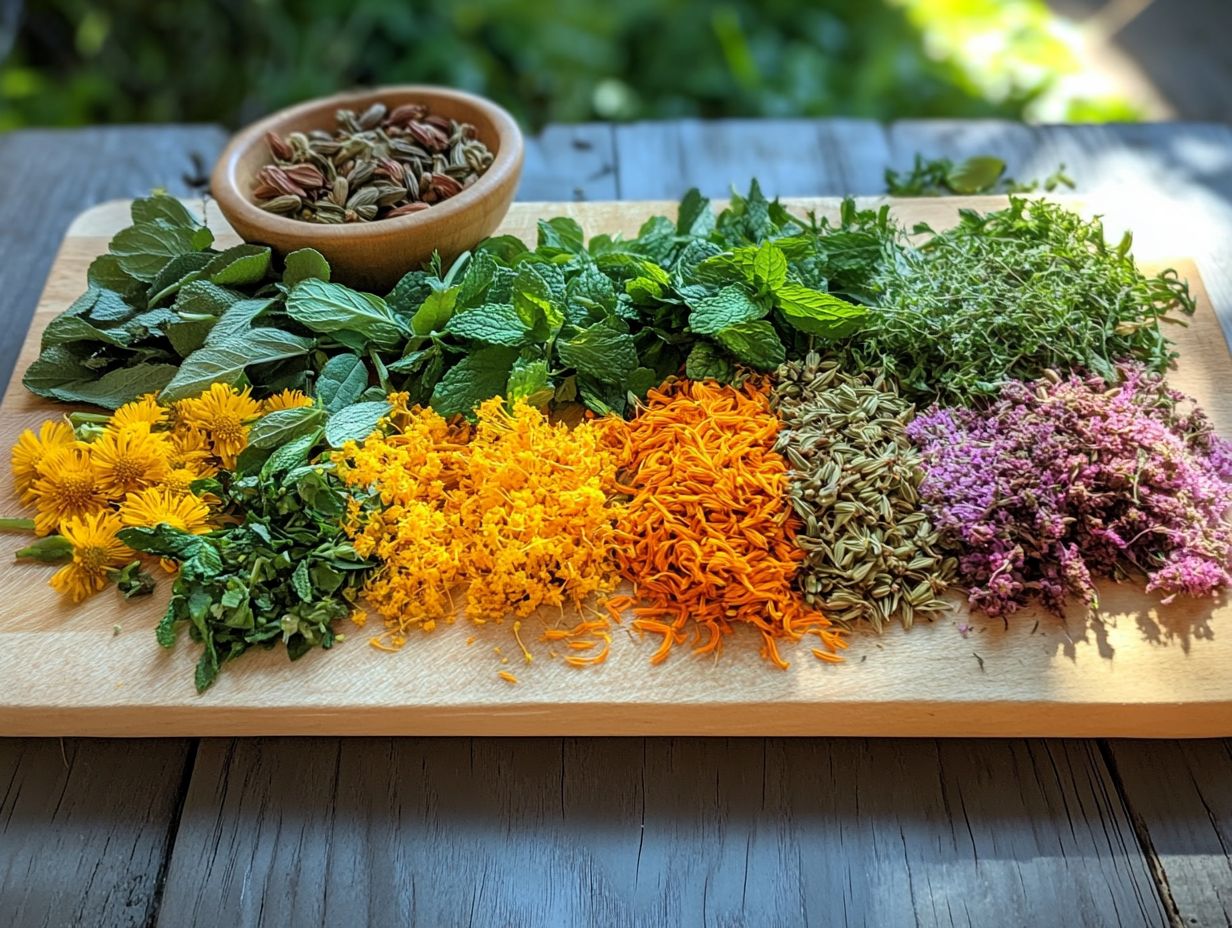
What are the top 5 herbs that support healthy digestion?
The top 5 herbs that support healthy digestion are ginger, peppermint, fennel, chamomile, and turmeric.
How does ginger support healthy digestion?
Ginger contains compounds that stimulate saliva, bile, and gastric juices to aid digestion. It also has anti-inflammatory properties that soothe the digestive tract.
Can peppermint help with bloating and gas?
Yes, peppermint relaxes the muscles in the digestive tract, which can reduce bloating and gas. It also calms the stomach, helping with nausea and indigestion.
Why is fennel beneficial for digestion?
Fennel is rich in anethole, a compound that relaxes and soothes the digestive tract. It has anti-inflammatory properties and helps reduce excess gas and bloating.
Can chamomile improve digestion?
Chamomile has been used for centuries to calm the digestive system. It reduces inflammation and spasms in the digestive tract and relieves symptoms of irritable bowel syndrome.
How does turmeric support healthy digestion?
Turmeric contains curcumin, which has anti-inflammatory and antioxidant properties. This can improve digestion and reduce symptoms of digestive conditions like ulcerative colitis and Crohn’s disease.

